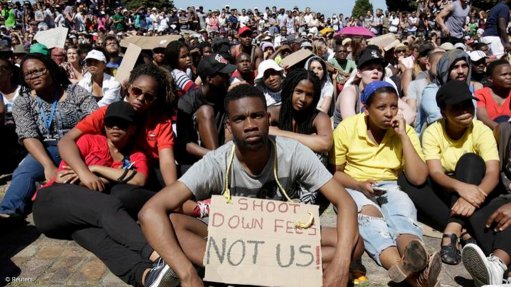
Photo by: Reuters
Yesterday, Students for Law and Social Justice (SLSJ), represented by the Legal Resources Centre, filed a submission with the Commission of Inquiry into Higher Education and Training (Fees Commission).
SLSJ’s submissions are based on a call to all of its members, provincial consultations and a national conference which engaged the question of further education in South Africa. In its submission, SLSJ argues that, in terms of South Africa’s Constitution and international law, higher education must be made progressively available and accessible and that fees are a primary consideration in determining a student’s ability to access higher education.
Accordingly, and based on a proposed inversely-proportionate sliding scale, SLSJ argues that for some prospective or current students, fee-free higher education may be the only way in which the constitutional right to access further education can be achieved. However, SLSJ does not interpret the Constitution to mean that, ultimately, higher education should be fee-free for all; rather that higher education should be universally available and accessible to all.
In determining a student’s ability to access higher education, SLSJ proposes that (1) application fees constitute a barrier to access higher education and should be removed; and (2) a student’s admission and tuition fees (including fees associated with the costs of living) should be based on the personal and / or family and / or household income, personal circumstances, existing debts, and any other relevant factors (including the best interests of the student, any forms of disadvantage, socio‑economic disparities, and historic or continuing social systems or structures).
SLSJ also submits that the Fees Commission should recommend that the President establish an implementation team to implement, in the short-, medium- and long-term, the Fees Commission’s findings on a sustainable financial‑funding model, which may be SLSJ’s proposed sliding scale.
In the interim, SLSJ argues that all application fees should be waived, the 0% fee freeze should continue, and graduands, who, as a result of financial difficulties are unable to graduate, should be assisted. In order to achieve these interim measures, the state should assist institutions.
Finally, SLSJ call on the Fees Commission to recommend that the President report to the public, one month after the Fees Commission submits its report, on the recommendations which the President will implement and the proposed timeframes for implementation.
At a press conference earlier today, Olwethu Mhaga, a member of SLSJ from the University of Pretoria, stated:
“We call on all sectors of society to come together and heed the call of students, as we seek to create a country where the circumstance of one’s birth is not a hindrance to the fulfilment of the potential within us all.”
SLSJ takes the view that the Fees Commission, in conducting its inquiry, should ensure openness and transparency, and that it should facilitate public awareness of its processes through, among other things, radio broadcasts and live streaming of its proceedings.
The Fees Commission was established by the President on 14 January 2016 and is mandated to enquire into, make findings, report on and make recommendations on the feasibility of making higher education and training fee-free in South Africa.
A copy of SLSJ’s written submissions can be found here=(http://www.slsj.org/2016/slsj-fees-commission-submission/).
Issued by Legal Resources Centre